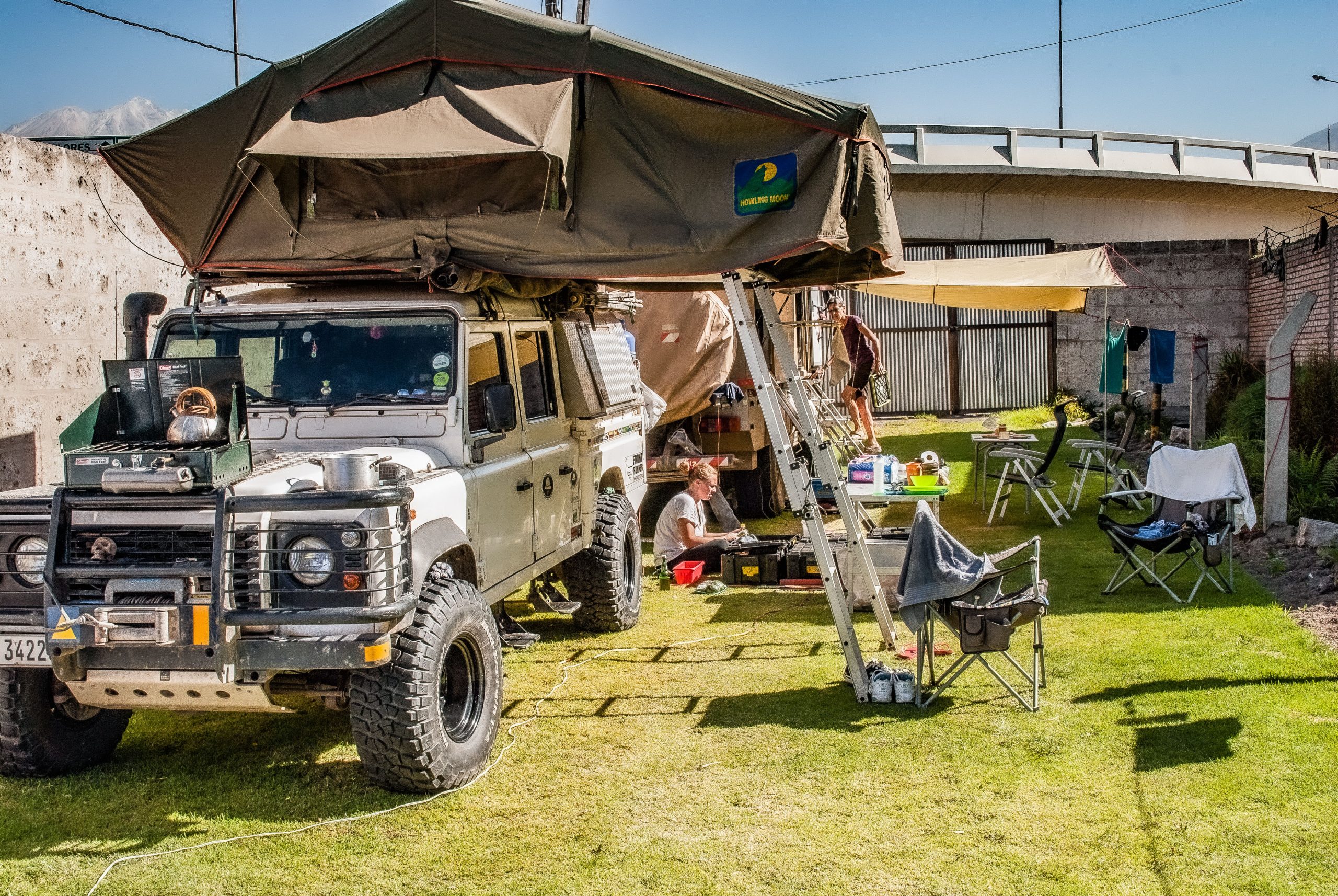It is inevitable that after a few arduous weeks or months on the road, you will eventually roll into an overland camp with the intention of staying only a night or two just to shower and rest or perhaps repair a limping vehicle. Blink and three weeks have flown blissfully by, grass may have grown around the tires, and you will have become part of the local scene. This phenomenon is known by many names, but we refer to it as the Camp Trap.

We have found ourselves semi-settled in campsites worldwide, from Morocco to Turkey to South Africa, Argentina, Senegal, Guatemala, and Mexico. Occasionally, in real life or online, you will come across overland travelers who claim that they never pay for or stay in “organized” camping, which may be a great and terrible mistake. International overland travel is stressful, expensive, complicated, and sometimes dangerous. It is a delight to find an oasis of safety, comfort, and shared experience where the tribe will accept you as you are. But beware—these camps are known to be an overlander’s Bermuda Triangle.
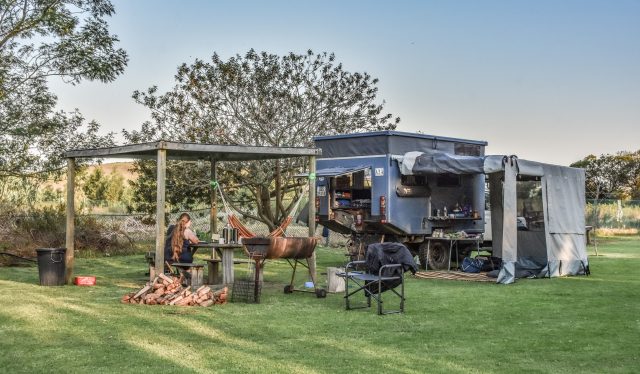
All great overland camps usually have one thing in common: they are built or run by experienced travelers, expats, or locals, who have enjoyed the trials, tribulations, and exultations of overland travel. These explorers will have stayed in hundreds of camps around the world, and they know exactly what a weary traveler needs. You might find modern, clean, and functional bathrooms, a laundry, a well-equipped communal kitchen, a covered chill area with power points, internet, a BBQ area, a fire pit, and maybe even a pool. There will be little touches of international flavor, be that décor, equipment, or practical improvements and innovations learned and remembered. Each campsite will be level, unpaved, and likely to have power, shade, a water supply, and, occasionally, sweet green grass.
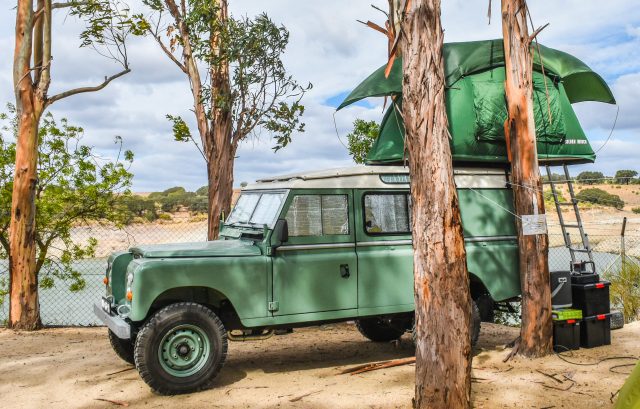
The best camps are located close to beautiful towns, villages, and sometimes cities that are frequently visited by overland travelers, and the owners will provide an introduction to the most reliable taxi services, tour operators, laundry services, mechanics, pizza places, and bakeries which produce a baguette even a Frenchman would enjoy. A few old kayaks or bicycles may be available to borrow, the latter for exercise or grocery runs into town. A sturdy shelf will house a well-worn book swap, and a pile of unwanted gear might clutter a corner, inviting adoption.

Camp security is an absolute priority, and overlander campsites are generally places where vehicles are never locked, windows are left open, and children are free to roam. These camps are affordable, and the longer you stay, the less you will pay. Often a small fee will buy a secure parking spot under a tree where you can leave your beloved overland rig when flying back home for a few months.
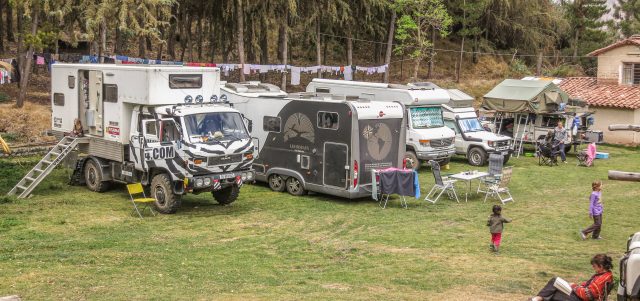
The most popular campsites will often be near full capacity, and you may have to book in advance. The prime site will be occupied by a Bavarian, his wife, their dog, and a large, ex-military truck that has not moved more than a foot in a year or two. Parked beside them will be the family from Brazil, beside them the young Swiss couple in a VW van, then a retired Swiss couple in a Mercedes truck, Argentine hippies and their New Age American and Canadian friends and their vans, more German trucks, a British biker in a tent, a Frenchman on a bicycle, and the young or retired American couple powered by an American diesel. They are the local experts and will know where you can find the best food, vehicle parts, rubber hoses, brass drifts, wheel bearings, tour guides, dentists, doctors, and immigration consultants. This is the true United Nations, and every single person there would have likely sacrificed more than others imagine and traveled further than most ever do; some have been traveling for many decades.
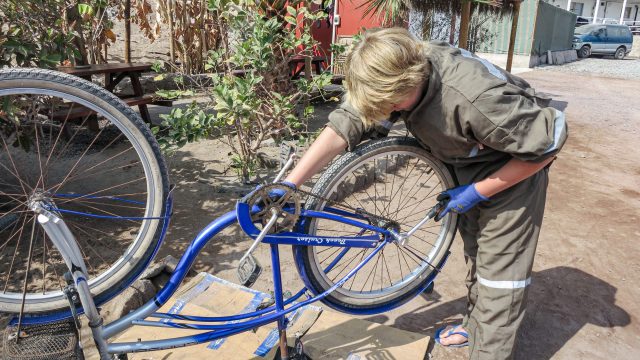
Your first day or two will be spent cleaning and maintaining the vehicle and camper, followed by a lazy day, or the first may be the lazy day, depending on how difficult the journey has been. Regular showers and indoor plumbing will leave you smelling and feeling like a million bucks. Soon you will realize that if you have the option to leave, you should not rush to exercise it.

International overlanders tend to go to bed late and rise late as the day is heated by the rising sun. Few travel with children, and many travel with dogs which are free to roam and mingle. The well-socialized dogs will enjoy morning, lunchtime, and evening play sessions, adored by a laager of onlookers. Laundry will flap lazily in the breeze, and a guitar may be strummed while someone in camp haughtily performs the Downward Dog. The song of birds and distant bark of stray dogs fill the air.

One unlucky soul will be permanently hunched over an engine bay or lying underneath a vehicle tinkering, as mechanical repairs in camp are perfectly acceptable (fluid and oil spills are unacceptable). All the mechanically minded overlanders, men and women, offer advice, spare parts, or an experienced hand. The older vehicles suffer the most failures and are loved by all as they exude the character, grit, and determination of a true adventure more than any modern vehicle could. When not repairing their vehicles, the overlanders discuss vehicles; judge or covet others’ vehicles; compare tire sizes; inspect accessories and modifications, home builds and professional builds; and discuss maintenance, oil types, hacks, and tips for keeping our homes rolling. English is the common second language.

When not discussing vehicles, we will discuss where our vehicles have taken us and a hierarchy of experience will be established. Those who have crossed the Amazon or West Africa assume they are overlanding elite, if there is such a thing, while those who have not offer mild reverence. There will always be that one guy who has been everywhere, done everything, and knows everything, and he tends to travel alone with an exhausted dog of an indeterminate breed. Stories will be exchanged, insider jokes told, and places referred to by colloquial acronyms or nicknames; Dar es Salaam is Dar, The Ivory Coast is CI, Johannesburg is Joeys, Chefchaouen is Chef, and Canada under Trudeau is Chinada.
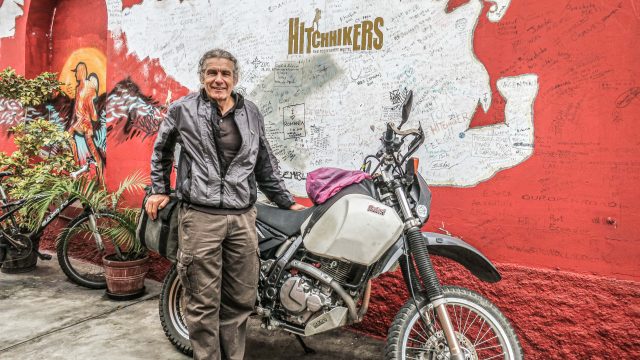
In time, maps will be spread and suggestions given for routes, border crossings, currency conversions, and shipping agencies; your head will swim with the names of places you will not remember until you have been there. You have to see this; can’t miss this; don’t bother going there; watch out for this place; this place is awesome, yeah; but that place is overrated and full of tourists.

Every day is Saturday, and at night the younger folks will usually have a drink or two, share a campfire, and solve the world’s problems while the older crowd will do the same, but with more confidence and less enthusiasm—they know the world as it is and would instead just relax. Loud music and noise are not tolerated, and the collective will ensure that everyone understands this. True overlanders do not generally play loud music, though their conversations may be boisterous. Every tête-à-tête is essentially the same but benefits from the color of experiences and cultures, which often see the world differently.
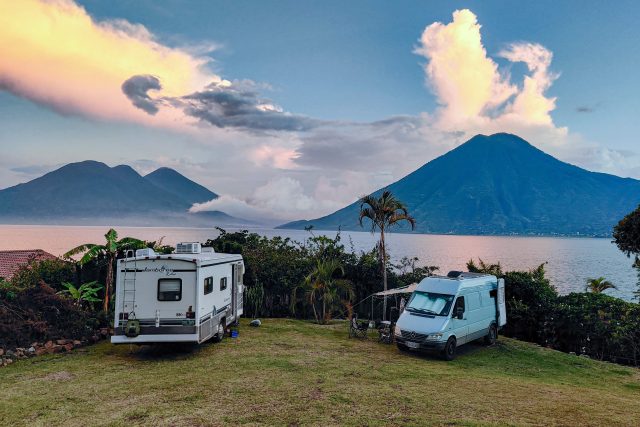
Unfortunately, and eventually, the day arrives when you realize that you have become more of a camper and less of an overlander, and your visa may be close to expiry. Even the best campsite experience inevitably becomes mundane when compared to the excitement of travel. You inform everyone that you will leave on Monday, but they do not believe you. When Monday arrives, Wednesday may seem like a better day to leave, and then the following Monday, Tuesday, or Wednesday? The day when you finally pack up the extended campsite, your new family will wait patiently for you to be ready to depart three hours later than planned; oh well, you might as well stay another day. Have a beer, have another, and leave on Tuesday! The Camp Trap is similar to the sweetly scented petals of a carnivorous flower; you will slip and slide as you try to escape, all the while a willing captive with a dull pain in the chest.
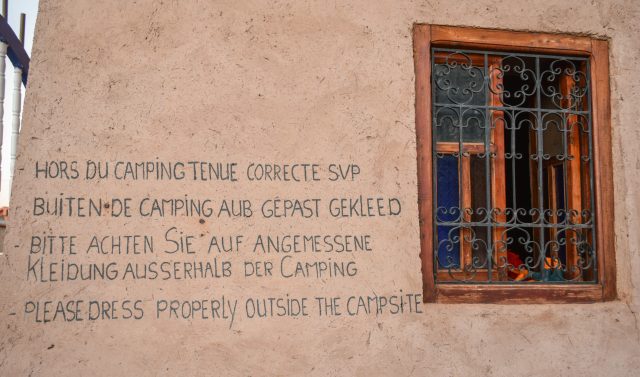
And then you leave, with hugs and waves. As you exit the gate and turn the corner, a truck will fire up and maneuver over the yellowed divots left by your green-tinged tires; a change is as good as a holiday, they say. After a few hours back on the road, you will feel similar to the day you first left your home, a bit unsure, slightly concerned, and excited. By the end of the day, you will feel the sweet pleasure of the open road. And within a week, you will be suntanned, slightly dirty, and grinning from ear to ear. For two or three months, you will continue to adventure, with all the associated roller-coaster ups and downs, until you arrive at the gates of a campsite with a great reputation. A smiling man opens the doors, and a green lawn beckons beside a palapa, a pool, and a large ex-military truck. Here you go again.
Our No Compromise Clause: We carefully screen all contributors to ensure they are independent and impartial. We never have and never will accept advertorial, and we do not allow advertising to influence our product or destination reviews.


